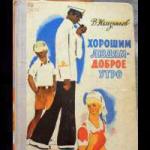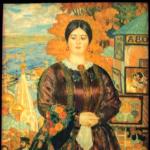Mtsyri's emotional speech with extraordinary power expresses his passionate, freedom-loving nature, elevates his moods and experiences.
The uniqueness of the young man’s personality is emphasized by the unusual circumstances of his life. From childhood, fate doomed him to a dull and joyless monastic existence, which was alien to his fiery nature. Captivity could not kill his desire for freedom; on the contrary, it strengthened him. And this kindled in his soul the desire to see his homeland at any cost.
While in the monastery, Mtsyri languished from loneliness. He did not find a single soul mate with whom he could talk, to whom he could open up. The monastery turned into a prison for him. All this prompted him to escape. He wants to escape from human life and escape into the arms of nature.
Having escaped during a thunderstorm, Mtsyri sees for the first time the world that was hidden from him by the walls of the monastery. That’s why he peers so intently at every picture that opens to him. The beauty and splendor of the Caucasus blinds Mtsyri. He retains in his memory “lush fields covered with a crown of trees growing all around”, “mountain ranges as bizarre as dreams.” These pictures stirred up in the hero vague memories of his native country, which he was deprived of as a child.
The landscape in the poem is not only the background that surrounds the hero. It helps to reveal his character and becomes one of the ways to create an image. Mtsyri's character can be judged by the way he describes nature. The young man is attracted by the power and scope of Caucasian nature. He is not at all afraid of the dangers that lurk in it.
Mtsyri perceives nature in all its integrity, and this speaks of his spiritual breadth.
The perception of the landscape is enhanced by the colorful epithets that Mtsyri uses in his story (“angry shaft”, “sleepy flowers”, “burning abyss”). The emotionality of the images is enhanced by unusual comparisons. For example, the trees on the hill remind him of “brothers in a circular dance.” This image seems to be inspired by memories of relatives, of his native village.
The culmination of Mtsyri's three-day wanderings is his fight with the leopard. He dreamed of a battle with a worthy opponent. The leopard became this opponent for him. This episode revealed Mtsyri's fearlessness, thirst for fight, and contempt for death.
Throughout his short life, Mtsyri carried a powerful passion for freedom, for struggle.
The originality of Mtsyri’s image lies in the fact that it reflects the real features of a highlander man. Belinsky called Mtsyri a “fiery soul,” “gigantic nature,” “the poet’s favorite ideal.” The romantic image of Mtsyri in this story continues to awaken in people the desire for action and struggle.
Answer
Mtsyri is the main character of the poem of the same name by M. Yu. Lermontov, a Caucasian youth who ended up in a monastery against his will. From the Georgian language the hero’s name is translated as “novice.” Mtsyri was captured at the age of six. The Russian general entrusted him to a monk in the ancient city of Mtskheta, since the boy fell ill on the road and did not eat anything. The monk cured him, baptized him and raised him in a true Christian spirit. But life in the monastery became a kind of captivity for the boy. The mountain boy, accustomed to freedom, could not come to terms with this way of life. When Mtsyri grew up and was about to take monastic vows, he suddenly disappeared. He quietly escaped from the fortress to find his native land. The young man was missing for three days and could not be found. Then local residents of Mtskheta found him, half dead and wounded.
When Mtsyri was returned to the monastery, he refused to eat and at first did not want to tell anything. Then he nevertheless confessed to the elder who had saved him once in childhood. He told how happy he was outside the walls of the monastery, how he met a young Georgian woman on the way, how he fearlessly fought with a leopard and defeated him. Despite the fact that the young man grew up far from the wild, in his soul he always wanted to live like his mountain ancestors. He regretted that he never found his father’s land, did not see his native village at least from afar. All three days he walked east from the monastery in the hope that he was on the right path, but it turned out that he was walking in a circle. Now he was dying as a slave and an orphan.
Most of all, the character of the main character is revealed in his confession. He talks about the days of his absence not in order to confess or repent, and not in order to ease his soul, but in order to once again experience the feeling of freedom. It was so natural for him to be among the wild, as well as to live and breathe. When he returns to the monastery, his desire to live disappears. He does not blame anyone, but he sees the cause of his suffering in the long years of imprisonment. Having been in a monastery since childhood, he not only became weaker, but also lost the instinct inherent in every mountaineer to find the way home. Before his death, he asks to be buried in the garden, from where the Caucasus can be seen.
Article menu:
The poem “Mtsyri” was one of M.Yu.’s favorite works. Lermontov, according to the memoirs of his contemporaries, the poet loved to read the text of the poem in public and knew it all by heart.
Basis of the poem
Poem by M.Yu. Lermontov's Mtsyri is based on a true story about a young monk who spent his entire life in a country foreign to him.
While in exile in the Caucasus, Lermontov meets a young monk living in Mtskheta. The monk told Mikhail Yuryevich his difficult fate: his little one was taken away from his native land and he was forced to spend his whole life in a part foreign to him.
Lermontov’s first ideas for implementing the theme of monasticism in the literary field arose back in 1831. The poet wanted to embody what he heard in the monk’s notes. Later, this idea, under the influence of the story of a monk from Mtskheta, was embodied in the poem “Mtsyri”.
Elements of autobiography
Many researchers of Lermontov’s literary heritage, in particular his poem “Mtsyri,” note a certain similarity between the young monk of the poem and M.Yu. Lermontov.
Belinsky argued that the poem exposes the author himself. The destinies of the author and the monk, despite their apparent differences, have a common basis. Loneliness and isolation from family are what these individuals have in common. Like Mtsyri, Lermontov grew up far from his relatives (the grandmother who raised him did her best to prevent him from communicating with relatives, in particular his father). This state of affairs became the cause of despondency both in the life of Lermontov and in the life of Mtsyri. In addition, they are also related by the Caucasus: for both Mtsyri and Lermontov, it became the embodiment of freedom.
Life path of Mtsyri
When Mtsyri was 6 years old, a tragedy happened in his life - a certain Russian general took the boy prisoner - thus, Mtsyri forever left his home, his family and the village dear to his heart - the village. On the way, the boy falls ill - separation from loved ones and a difficult long road provoked this condition. One of the monks took pity on the child and took him to the monastery: “out of pity, one monk looked after the sick man, and he remained within the guardian walls, saved by friendly art.”

Despite the disappointing forecasts, Mtsyri survived and soon turned into a handsome young man. He learned the unfamiliar language that was spoken in this area, learned about the customs and peculiarities of life in this region, but he never managed to get rid of longing for his family and his home.
Languishing in despondency, Mtsyri makes attempts to escape and find his native village, but his intentions were not destined to come true.
Lermontov describes in detail Mtsyri's last escape - during a thunderstorm, the young man leaves the walls of the monastery - for three days he wanders along the paths in the hope of finding the right path home, but fate is extremely unkind to him - such a promising path becomes a tragedy - after a fight with a leopard, the young man's strength has noticeably decreased, This was facilitated by the wounds received in the battle; in the end, the path leads Mtsyri to the same monastery. Realizing all the hopelessness, the young man dies under the influence of his wounds and general despondency.
Characteristics of personal qualities
Mtsyri became a monk by coincidence. Until the age of six, he was not filled with the desire to devote his life to serving God, and in particular, he knew nothing about Christianity. Only after he entered the monastery was he baptized.
Like all romantic heroes, Mtsyri has a special relationship with nature, in particular with the Caucasus mountains.
Life in a monastery, enclosed by bare, cold walls, has a depressing effect on him. Lermontov does not talk in detail about the attitude of other monks towards Mtsyri, but, based on their general mood, it can be assumed that it did not go beyond the bounds of decency - the monks were kind to the stranger who grew up within the walls of their monastery, but they were not able to understand his spiritual groaning .
Mtsyri belongs by origin to the mountain peoples and, like his father, he was very proud in childhood: “He refused food, and died quietly, proudly,” and did not lose this characteristic in his youth: “And, having listened proudly, the sick man stood up, having gathered the rest of my strength."
Mtsyri's life is full of sad longing and the desire to find lost happiness: “I wandered silently, alone, looked, sighing, to the east, tormented by an unclear longing for my native land.”
He was always a kind person and “did no harm to anyone.” He is a pure-hearted person, like a “child.” However, life in a monastery far from his homeland weighs heavily on him. The monks are not able to understand such melancholy of a young monk, since they themselves have never experienced it. Monks are alien to attachment to nature and freedom, they are afraid of thunderstorms, considering it the creation of God, while Mtsyri has no fear of this natural phenomenon at all - he is a child of nature and a thunderstorm, like any natural phenomenon, is something close and natural for him , therefore, within the walls of the monastery Mtsyri “was forever alien to them, like a steppe beast.”

All Mtsyri’s dreams and desires came true around gaining freedom and happiness. He wants to live freely, like in childhood. For this purpose, he escapes from the monastery. Since Mtsyri has never traveled, he goes at random, guided by the view of the mountains. An unexpected meeting with a leopard began to ruin his plans. The young man had no choice but to engage in battle with a wild beast. During the fight, Mtsyri was brave and strong. He would make an excellent warrior. He defeats the leopard: “He rushed to my chest; but I managed to stick my weapon into my throat and turn my weapon twice.”
Dear readers! We invite you to follow the story “Hero of Our Time” by Mikhail Yuryevich Lermontov.
The wounded Mtsyri moves further and further away from the mountains and soon comes to the outskirts of the monastery. Discouraged, he loses consciousness, the monks who find him take him to the walls of the monastery, which for many years was a prison for Mtsyri. The young man realizes that his cherished dream will never come true - he will die on a foreign land: “Only one thing saddens me: my corpse is cold and dumb and will not smolder in my native land.”
Thus, in the poem “Mtsyri” by M.Yu. Lermontov portrayed the image of a man who was not able to withstand the difficulties of life and find happiness. Mtsyri always had a childish, pure soul, he was a kind person, although at the same time, gloomy and unsociable, but the reason for such gloominess was his mental anguish from separation from his natural environment and home.
(378 words)
The poem “Mtsyri” was written by Mikhail Yuryevich Lermontov in 1839. This work is rightfully considered an example of Russian romantic poetry, and it has an interesting backstory. The author often visited the Caucasus, and it is believed that the plot of the book was based on events that actually happened to the writer. Traveling along the Georgian Military Road, he came across the main cathedral of Georgia - Mtskheta and met a lonely monk who told him the story of his life, and later a grateful listener described it in poetry.
The story of Mtsyri is a story about a lonely mountaineer boy who, by chance, found himself a student in a temple monastery (from the Georgian language “mtsyri” is translated as “novice”, “non-serving monk”). During his short life, the captive learned the local language, traditions and got used to living in captivity, but he was never able to understand who he really is, because family plays a big role in the formation of personality, which, unfortunately, he never has was.
The image of Mtsyri is, first of all, the image of a lonely person in search of the meaning of life. After spending a long time in the monastery, he finally decides to get out into the wild, experience new feelings, and experience freedom. After living for three days outside the monastery, the young man remembers his native language, the faces of his relatives: his father, sister and brother. There is hope in his heart that he will be able to find his father’s house, but this dream is not destined to come true. The prisoner dies after a fight with a tiger. Before death, confessing to the priest, the fugitive pours out his soul, sheds the light of truth on his fate. He dies with the thought that he remained a slave, a prisoner and was unable to see the place where he was born.
Of course, Mtsyri could be devoted to his country, family, home, he could have taken place as a person, but his wanderings are a metaphor for the life of each of us. For three days, the prisoner experienced the main feelings and impressions: struggle, passion, admiration for nature and disappointment in himself and the world. We, too, experience all this and yearn for an unattainable ideal. In a religious sense it is Eden, in a practical sense it is the highest level of consumption, in a personal sense it is happiness, in a creative sense it is recognition, etc. Therefore, the drama of the freedom-loving young man is the story of the ups and downs of each of us; this image reflects the face of humanity.
In his dying confession, he says that he wants to be buried in the far corner of the monastery garden, so that the view from his grave overlooks the hero’s native mountains. Mtsyri is a romantic hero, and despite the fact that in the last scene we see him broken, he dies with the thought that perhaps someday he will meet his family and friends.
Interesting? Save it on your wall!Mtsyri is the main character of the poem “Mtsyri” by Lermontov, which the poet wrote in 1839. The name itself already contains a hint of the future fate of the hero, because “Mtsyri” from Georgian can be translated in two different ways. In the first case it will be “monk, novice”, in the second case it will be “stranger, foreigner”. Between these two poles Mtsyri’s life passes.
His story begins in childhood, when a Russian conquering general passing by a Georgian monastery leaves a small child for the monks to raise. Mtsyri was taken from his native village as a prisoner, and the reader can only guess about the fate of his relatives. Apparently, his loved ones died in the war, and Mtsyri was left an orphan. Unable to bear the separation from his family and the hardships of the journey, he fell ill, refused food and was already close to death, “dying quietly, proudly.” By a lucky chance, Mtsyri was lucky: one of the monks became attached to him, managed to go out and raise him. The young man grew up within the walls of the monastery, learned the language and was preparing for tonsure. It seems that this is a common story, one of many others like it created by the war: a savage mountaineer assimilated into a cultural environment, accepted Christianity and began to live a new life. But Lermontov would not have been a great poet if he had not turned this story completely differently, and on the eve of his tonsure, on a terrible stormy night, when humble monks do not dare take their eyes off the icons, Mtsyri runs away!
Of course, they are looking for Mtsyri, but for three whole days all searches turn out to be in vain. And when they are almost about to stop, having decided that the young man has reached his native place, he is still found in the steppe, “without feelings,” terribly pale and thin. Mtsyri is sick, and, as in childhood, again refuses food and any explanations. Realizing that his hour of death is approaching, the same elderly monk who raised him is sent to him: perhaps he will be able to exhort Mtsyri to confess and ease his soul. And the hero pronounces his confession, but not a repentant one, but a proud and passionate one, in which the main character traits of Mtsyri are revealed.
Mtsyri escapes because, as he says, he never considered life in the monastery to be life. Yes, the monk saved him from death, but, Mtsyri asks him, “Why?..”. This question already clearly expresses the personality of Mtsyri, who prefers death to captivity. He grew up in captivity, his mother did not sing lullabies over him, and his peers did not invite him to play. It was a lonely childhood, and so Mtsyri turned out to be “a child at heart, a monk by destiny.” The young man is tormented by the dream of seeing his homeland and, at least for a moment, touching everything that he was deprived of. He decides to escape, clearly realizing that he is risking everything, because no one is waiting for him outside the monastery. And yet, finding himself free, Mtsyri enjoys life as best he can. He views with delight the world he was deprived of. The gloomy and silent novice suddenly transforms. We see that the main character of “Mtsyri” is not only a rebel, he is also a romantic, a poet, but this trait of his character can only be revealed in the conditions of the beautiful Caucasian nature. High mountains, vast forests, stormy streams and the blue sky spreading everywhere - everything in this landscape suggests the absence of any prohibitions, about complete freedom, so natural for humans. Mtsyri listens to the voices of rivers and grasses, admires the stormy night, and then the silence of midday. Even when he is dying, he does not forget the beauty of the world, enthusiastically telling the monk about everything he saw. Nature became closer to Mtsyri than the people around him. It is thanks to unity with her that he can realize himself as a free person. This is how the poem realizes the image of a romantic hero who turned out to be more receptive to beauty than the “enlightenment” monks who raised him.
However, Mtsyri’s admiration for nature is not just passive admiration. Having experienced the first joy of escape, he begins to plan his further path. A daring idea appears in his head: to get to the Caucasus, visible in the distance! Does Mtsyri understand that no one is waiting for him in his homeland, and even his home was destroyed by the war? Most likely, he understands, but Mtsyri (and this was especially important for Lermontov) is a hero of action. Mtsyri’s description also carried another idea: to reproach Lermontov’s contemporaries, the generation of the 1830s, for complete passivity, failure to develop spiritually and change the world around them. The poet more than once touched upon the idea of the inactivity of his generation in his work (remember “Borodino”). Mtsyri, the main character of Lermontov’s poem, clearly indicates what, in his opinion, should be done. Mtsyri struggles with fate and life's adversities, not paying attention to any obstacles.
Three tests await him, each of which can lead Mtsyri astray. At first, the hero meets a girl, a beautiful daughter of the East, who came to the source for water. A light wind sways her veil, and the “darkness of her eyes” makes the young man forget about everything. The first love arises in his soul, demanding fulfillment. Everything works out in Mtsyri’s favor: the beauty lives nearby. He sees her approaching her quiet house, watching “how the door quietly opened... / And closed again! .." Mtsyri could have entered this door after the girl, and who knows how his life would have turned out... But the desire to return to his homeland turns out to be stronger. Mtsyri admits that the memories of those minutes are precious to him, and wishes that they would die with him. And yet he is driven by one thing:
“I have one goal -
Go to your home country -
Had it in my soul and overcame it
Suffering from hunger as best I could"
Mtsyri continues to move forward, but nature itself, personified in the image of a leopard, stands in his way. A well-fed, powerful beast and a man exhausted by endless fasts and the air of captivity - the forces seem unequal. And yet Mtsyri, picking up a branch from the ground, managed to defeat the predator. In a bloody battle, he proves his right to return to his homeland.
The last obstacle separating the hero from the desired Caucasus is the dark forest in which Mtsyri got lost. He continues to move forward to the last, but what is his despair when he realizes that he has been walking in circles all this time!
“Then I fell to the ground;
And he sobbed in a frenzy,
And gnawed the damp breast of the earth,
And tears, tears flowed
Into her with flammable dew..."
Mtsyri's strength leaves him, but his spirit remains invincible. The last form of protest available to him is death, and Mtsyri dies. In death he will be able to find liberation, unavailable on earth, and his soul will return to the Caucasus. And, although he does not think about it, his life and his feat, incomprehensible to the monks, will not be forgotten. Mtsyri, the hero of Lermontov’s poem, will forever remain for subsequent readers a symbol of unbending will and courage, thanks to which a person can fulfill his dream, not paying attention to anything.
A description of the personality of the main character and the main character traits of Mtsyri can be used by 8th grade students when writing an essay on the topic “The main character of Lermontov’s poem “Mtsyri””
Work test




